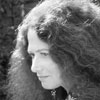Music comes with instructions:
pianissimo, forte.
In Nô plays the actors wear masks,
so their souls can be seen:
wild haired old woman, callow young priest.
Each morning I wake in strange country,
my bed made of strange wood.
Time arrives clockless.
Rain poses hieroglyphic, with bent knees,
shoulders askew, arms lifting
from out of the future
the future—
a box labeled neither
"Requests" nor "Suggestions."
What is, what will be,
is honey.
Touched, it sticks to the fingers.
Andromeda overhead, silent.
Below, ears, eyes,
an aching elbow,
Chekhov, the laboring bees.
-
Spring Feature 2015
-
Feature
- Poets in Person Jane Hirshfield from San Francisco, CA
-
Poetry
- Sandra Alcosser
- David Baker
- Chana Bloch
- David Bottoms
- Cyrus Cassells
- Carl Dennis
- Stephen Dunn
- Laura Fargas
- Sandra M. Gilbert
- Jane Hirshfield
- Ted Kooser
- Dorianne Laux
- Thomas Lux
- Mary Mackey
- Wesley McNair
- Dunya Mikhail
- Joseph Millar
- Jim Moore
- D. Nurkse
- Naomi Shihab Nye
- Robert Pinsky
- Gerald Stern
- Jean Valentine
- Rosanna Warren
- Matthew Zapruder
-
BOOK REVIEW
- David Rigsbee reviews The Beauty
by Jane Hirshfield
- David Rigsbee reviews The Beauty
Feature > Poetry
I Profess The Uncertain
I profess the uncertain
with gratitude
a man with large hands
and large feet
first looks at a pencil
then brings it close to his ear
he listens
the day lives briefly
unscented
shaken with worn-heel glimpses
becomes a shambling palace
with walking fishes
a yellow-roofed kindness
the almost untenable premise
that between counting one and two
nothing is lost
with gratitude
a man with large hands
and large feet
first looks at a pencil
then brings it close to his ear
he listens
the day lives briefly
unscented
shaken with worn-heel glimpses
becomes a shambling palace
with walking fishes
a yellow-roofed kindness
the almost untenable premise
that between counting one and two
nothing is lost
They Have Decided
Comes a time they have decided who you are.
But you have not decided who you are.
Your wrists have decided.
Your knees have decided.
The hair that will leave its color behind has decided.
Your ears, your rebelling ears,
have decided: enough.
They surrender cacophony, beauty, names, whistlings, cries.
Your thoughts, it seemed once, had decided.
But you, you yourself, had not yet decided.
Like a foal still trying to find which leg goes where for standing,
you have not decided.
But you have not decided who you are.
Your wrists have decided.
Your knees have decided.
The hair that will leave its color behind has decided.
Your ears, your rebelling ears,
have decided: enough.
They surrender cacophony, beauty, names, whistlings, cries.
Your thoughts, it seemed once, had decided.
But you, you yourself, had not yet decided.
Like a foal still trying to find which leg goes where for standing,
you have not decided.
Round
Under every footstep,
burning magma.
Under every sentence:
we are alive.
Under that:
someday we won't be.
Try it—
"A bio-engineered lacrimal gland is successfully shedding tears,
and we are alive."
"Soldiers in Afghanistan held funerals for their disabled battlefield robots
and someday we won't be."
Each moment, handshake, glance, inside itself murmurs:
I love you, and we are alive,
I love you, and someday we won't be.
But equally:
Love is no longer, and someday this knife-edge will dull.
Opinion, hope, regret, an untempered piano—
the farther you go from the middle, the stranger they sound.
Under every footstep,
burning magma.
burning magma.
Under every sentence:
we are alive.
Under that:
someday we won't be.
Try it—
"A bio-engineered lacrimal gland is successfully shedding tears,
and we are alive."
"Soldiers in Afghanistan held funerals for their disabled battlefield robots
and someday we won't be."
Each moment, handshake, glance, inside itself murmurs:
I love you, and we are alive,
I love you, and someday we won't be.
But equally:
Love is no longer, and someday this knife-edge will dull.
Opinion, hope, regret, an untempered piano—
the farther you go from the middle, the stranger they sound.
Under every footstep,
burning magma.
A Handle-less Door
in certain early frescoes one figure
in the crowd
is always pointing back
this, we are told,
that the viewer will not remain tempted
to look away from the central scene
suffering and distraction
distraction and suffering
as a woman slow in her dying watches TV
how tenderly the donkey's ear
the little sitting dog
are rendered
in the crowd
is always pointing back
this, we are told,
that the viewer will not remain tempted
to look away from the central scene
suffering and distraction
distraction and suffering
as a woman slow in her dying watches TV
how tenderly the donkey's ear
the little sitting dog
are rendered



